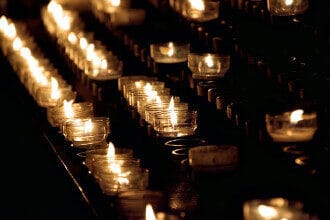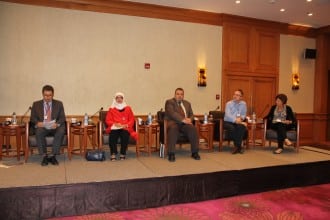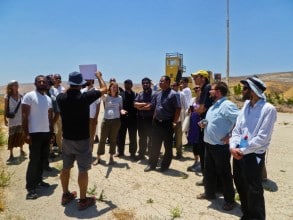By Aryeh Ronay – One day a week, the Jewish people stop their work and dedicate a day to rest, rejuvenation and spiritual growth. Did you know that resting one day a week can be the best thing for your body, your soul and the planet? Let’s explore the Shabbat blessings and their transformative power.
Saying “Shabbat Shalom”
Saying “Shabbat Shalom” is a blessing we give to other people on Shabbat. As Lisa Cohen describes in her article, Understanding the Meaning of “Shabbat Shalom”, saying “Shabbat Shalom” is a way to bless someone with a “peaceful Shabbat.” On other Jewish holidays we can say “Chag Sameach,” which means “happy holidays,” but only on Shabbat do we say “Shabbat Shalom.”
Friday Night Blessings
In practice, Shabbat starts a few minutes before sunset on Friday and runs until an hour after sunset on Saturday. Therefore it lasts about 25 hours.
Lighting Shabbat Candles
The first blessing of Shabbat occurs on Friday evening before sunset, during the Shabbat candle lighting, and like almost every traditional blessing in Judaism, it begins with the words “Blessed are you, LORD our God, king of the universe.”
Some Jewish communities light the candles and then say the Shabbat candle blessings and some say the blessings and then light the candles. Whatever order they bless, all Jewish communities understand that with the Shabbat candle blessing, we officially enter into the holy realm of Shabbat.
Blessing the Children
On Friday night, parents bless their children using verses from the bible. Sons are blessed, “may you be like Ephraim and Menashe” and daughters are blessed, “may you be like Sarah, Rebecca, Rachel, and Leah.”
Both are blessed with the priestly blessing:
May God bless you and protect you.
May God show you favor and be gracious to you.
May God show you kindness and grant you peace.
Kiddush – Blessing Over Wine
Kiddush is the blessing made over a cup of wine or grape juice. Kiddush is a way of sanctifying the day as not just a Saturday, but as a holy Shabbat.
In this prayer we hold up our grape beverage, bless God, and pray that God bless us in turn with a wonderful Shabbat.
Challah – Blessing Over Bread
The last blessing we make before we eat the Shabbat meal is the blessing on challah, which is plaited bread.
First we wash our hands with a cup and a special blessing. Then we take two loaves of bread, bless God, and eat the challah, which is the first course of the Friday night meal.
Blessings at the End of Shabbat
At the end of the Shabbat, an hour after sunset, we make havdalah, literally, “the separation.” We sing and do rituals to mark off that our holy Shabbat is coming to and end, and we are re-entering the work-week. We smell fragrant herbs, look at our finger nails in the light of the special havdalah candle flame and we contemplate our transition away from Shabbat.
We don’t need to fret. We know that the special energy of Shabbat will accompany us through the week, and that the next Shabbat is never more than 6 days away.
How Shabbat Can Bless us and All of Creation
Exodus 35:2 – on Six Days Work May Be Done, but on the Seventh Day You Shall Have a Sabbath of Complete Rest, Holy to the Lord; Whoever Does Any Work on It Shall Be Put to Death.
“The Sabbath and Ecology” By Rabbi Yonatan Neril, as seen in Eco Bible
So impactful is this commandment, today most of the world’s population enjoys a “weekend” that can be traced back to this commandment.
Rabbi Norman Lamm writes:
Perhaps the most powerful expression of the Bible’s concern for man’s respect for the integrity of nature as the possession of its Creator, rather than his own preserve, is the Sabbath . . . The six workdays were given to man in which to carry out the commission to “subdue” the world, to impose on nature his creative talents.
But the seventh day is a Sabbath; man must cease his creative interference in the natural order (Jewish law’s definition of Melakha or work), and by this act of renunciation demonstrate his awareness that the earth is the Lord’s and that man therefore bears a moral responsibility to give an accounting to its Owner for how he has disposed of it during the days he “subdued it” . . . A new insight into Jewish eschatology: not a progressively growing technology and rising GNP, but a peaceful and mutually respectful coexistence between man and his environment.”
Shabbat to Save The World
Observance of Shabbat – taking a day each week to refrain from the transformation of nature – has the potential to alter a person’s feeling of creative and technological control over nature.
In early nineteenth-century Germany, Rabbi Samson Raphael Hirsch senses the profound relevance of Shabbat for industrial society, exclaiming, “Sabbath in our time! To cease for a whole day from all business, from all work, in the frenzied hurry-scurry of our time! . . . The pulse of life would stop beating and the world perish! The world perish? On the contrary, it would be saved.”
Society Needs To Rest and Reflect
This message of Shabbat is sorely needed in today’s Western society. The mentality and lifestyle of “doing” without regard to “being,” of transforming the natural world without taking time to reflect on the value of that transformation, is taking an environmental toll on the planet.
A society that never rests nor reflects is the same society that over-extracts and over-consumes. This mastery of the earth without sufficient contemplation of its consequences has produced ecological destruction on the local, regional, and global level.
Shabbat Blessings to Our Creator
Air and water pollution. Species loss. Climate change. These are problems not of the environment, but of a society bent on doing and producing seven days a week.
A New York Times Magazine article commented on American lifestyles, saying, “A nation of remarkably productive, often well-paid workers . . . are becoming increasingly reluctant to pause from their labors and refresh their souls.”
On Shabbat, we are to walk on the earth without asserting our mastery over it, in order to acknowledge the sovereignty of the Creator. In this way, we will remember that we are only the custodians of the earth with the responsibility “to work it and to guard it” (Genesis 2:15).
* Featured image source









I like to learn more about the Jewish faith
Learn it. It’s pretty good to learn and get insights. I am doing it and it gives me great joy.
I apologize I didn’t check my spelling or grammar 😏 point I was trying to make is I honor our mighty God and each other we are one in the spirit we are one in the Lord
Thank you, what a wonderful and informative article. I honor the sabbath day as a modern Christian, and they honor, and recognize Shabbat as the beginning of my miraculous, healing and journey with the Lord my God. God is all things it is a Christian. I also believe Christ is all things. The thing is, we can all honor in love one another and honor our mother the Earth.